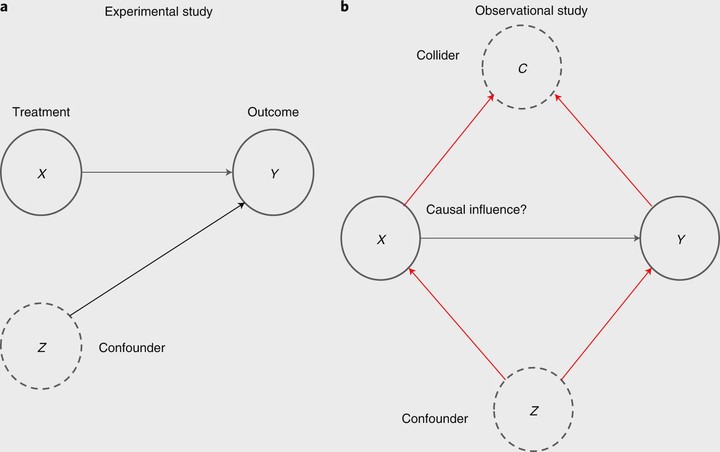Causal Data Science for Business Analytics
6 ECTS Module for Master Students
Credits
- 6 ECTS module
- 2 courses
Causal Data Science(Lecture) &Business Analytics with Causal Data Science(Problem-based Learning)
Target Audience
- Master students in “Data Science” and “Internationales Wirtschaftsingenieurwesen (IWI)”
- Students with a strong interest and motivation in acquiring the skills required for mastering the causal aspects of modern business analytics.
Instructor(s)
Overview
Most managerial decision problems require answers to questions such as “what happens to Y if we do X?”, or “was it X that caused Y to change?” In other words, practical business decision-making requires knowledge about cause-and-effect. While most data science and machine learning approaches are designed to efficiently detect patterns in high-dimensional data, they are not able to distinguish causal relationships from simple correlations. That means, commonly used approaches to business analytics often fall short to provide decision makers with important causal knowledge. Therefore, many leading companies currently try to develop specific causal data science capabilities.
This module will provide an introduction into the topic of causal inference with the help of modern data science and machine learning approaches and with a focus on applications to practical business problems from various management areas. Based on an overarching framework for causal data science, the course will guide students to detect sources of confounding influence factors, understand the problem of selective measurement in data collection, and extrapolate causal knowledge across different business contexts. We also cover several tools for causal inference, such as A/B testing and experiments, difference-in-differences, instrumental variables, matching, regression discontinuity designs, etc. A variety of hands-on examples will be discussed that allow students to apply their newly obtained knowledge and carry out state-of-the-art causal analyses by themselves.
Objectives
After completing this module, students will be able to:
- Understand the difference between “correlation” and “causation”
- Understand the shortcomings of current correlation-based approaches
- Develop causal knowledge relevant for specific data-driven decisions
- Formalize intuition about causal relationships using a “language” of causality
- Derive causal hypotheses that can be tested with data
- Discuss the conceptual ideas behind state-of-the-art causal data science tools and algorithms
- Carry out causal data analyses with state-of-the-art tools
Grading
- Students are evaluated based on their solutions of challenges assigned in each session, which they continuously document in their lab journals.
Registration
- Please register for the entire module
Causal Data Science for Business Analyticshere: E-Learning StudIP
Time & Location
Causal Data Science (Lecture): Monday, 11.30 - 13.00, Building D, Room D - 1.023Business Analytics with Causal Data Science (PBL): Tuesday, 15.00 - 16.30, Building O, Room O - 0.007
Course Notes & Materials
Access to course notes & materials will be published on StudIP.
Preliminary Schedule
| Session | Date | Topic |
|---|---|---|
| 1 | April 15 & 16 | Introduction to Causal Inference |
| 2 | April 22 & 21 | Graphical Causal Models |
| 3 | April 29 & 30 | Randomized Experiments & Linear Regression |
| 4 | May 6 & 7 | Observed Confounding |
| 5 | May 13 & 14 | Double Machine Learning |
| - | May 20 & 21 | Holiday |
| 6 | May 27 & 28 | Effect Heterogeneity |
| 7 | June 3 & 4 | Unobserved Confounding & Instrumental Variables |
| 8 | June 10 & 11 | Difference-in-Differences |
| 9 | June 17 & 18 | Synthetic Controls |
| 10 | June 24 & 25 | Regression Discontinuity |
| 11 | July 1 & 2 | Causal Mediation |
| 12 | July 8 & 9 | Causal Discovery |
Literature
Primary
- Ding, Peng (2023). A First Course in Causal Inference. arXiv preprint arXiv:2305.18793.
- Facure, Matheus (2023). Causal Inference in Python - Applying Causal Inference in the Tech Industry. O’Reilly Media.
- Huber, Martin (2023). Causal analysis: Impact evaluation and Causal Machine Learning with applications in R. MIT Press, 2023.
- Neal, Brady (2020). Introduction to causal inference from a Machine Learning Perspective. Course Lecture Notes (draft).
Secondary
- Angrist, J. D., & Pischke, J. S. (2014). Mastering metrics: The path from cause to effect. Princeton university press.
- Cunningham, Scott (2021). Causal Inference: The Mixtape, New Haven: Yale University Press.
- Gertler, Paul J., et al. (2016). Impact evaluation in practice. World Bank Publications.
- Hernán Miguel A., and Robins James M. (2020). Causal Inference: What If. Boca Raton: Chapman & Hall/CRC.
- Huntington-Klein, Nick (2021). The effect: An introduction to research design and causality. Chapman and Hall/CRC.
- Imbens, G. W., & Rubin, D. B. (2015). Causal inference in statistics, social, and biomedical sciences. Cambridge University Press.
- Mullainathan, Sendhil, and Jann Spiess. (2017). Machine Learning: An Applied Econometric Approach. Journal of Economic Perspectives, 31(2): 87–106.
- Pearl, Judea, and Dana Mackenzie (2018). The Book of Why. Basic Books, New York, NY.
- Pearl, Judea, Madelyn Glymour, and Nicholas P. Jewell (2016). Causal Inference in Statistics: A Primer. John Wiley & Sons, Inc., New York, NY.
- Peters, Jonas, Dominik Janzing, and Bernhard Schölkopf (2017). Elements of causal inference: foundations and learning algorithms. The MIT Press.
